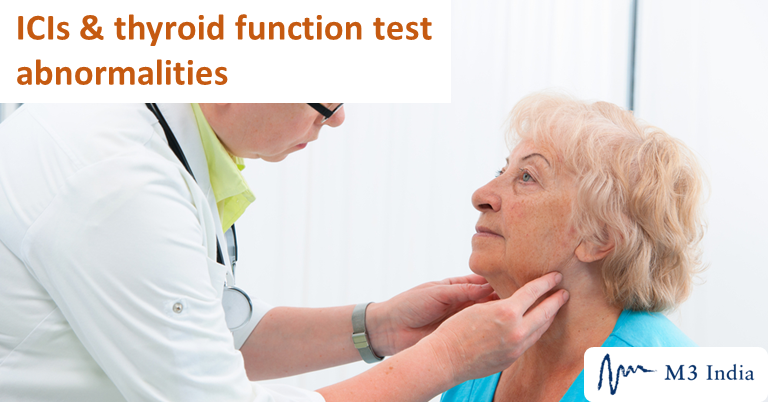ICIs & thyroid function test abnormalities: Implications in practice
M3 India Newsdesk May 22, 2019
Summary
Immune check inhibitors (ICIs) can lead to auto-immune toxicities and trigger thyroiditis, categorised under endocrine immune-related adverse events (IRAEs). Monitoring thyroid function tests in cancer patients can therefore be very helpful in preventing transition to hypothyroidism warranting long-term levothyroxine therapy.

Immune-related thyroiditis (irT)
Depending on the ICI therapy (anti‐CTLA‐4, or anti‐PD‐1) used, immune‐related adverse events and thyroid function test abnormalities (TFTAs) are common with a reported incidence range of 2% to 15%.
Within 4 days, early onset of mainly asymptomatic thyrotoxicosis can result from (ICI)-mediated thyroiditis which can also rapidly progress to hypothyroidism. Long term levothyroxine replacement with regular monitoring and follow up may be required if the hypothyroidism is permanent.
The American Thyroid Association current guidelines already enlist amiodarone, lithium, interferon-α, interleukin (IL)-2, and tyrosine kinase inhibitors as drugs that can lead to drug-induced painless thyroiditis. Since ICIs enhance anti-tumoral responses, they may also prompt the immune system to attack healthy organs and cause potentially serious side effects that may affect any organ, but traditionally ICIs have been associated with a unique set of immune-related adverse events (AEs) in the skin, gastrointestinal tract, and the endocrine system.
The most common endocrine side effects are hypophysitis and thyroid dysfunction. Since hypothyroidism, hyperthyroidism, and thyroiditis are unique immune-related AEs, it is likely that they are all part of the same disease process and as such endocrinologists need to be alert and better prepared for managing thyroid diseases that may develop in oncology patients when treating them with ICIs.
Clinical evidence
To ascertain if ICIs can be added to the list of drugs that can lead to drug-induced painless thyroiditis, researchers studied the effects of ICIs (nivolumab alone or in combination with ipilimumab, and pembrolizumab) on immune-related thyroiditis (irT) over a 20-month period in 657 patients on ICIs for a variety of cancers. Only 47 patients that met all the study inclusion criteria were studied. The chief findings were:
- After ICI treatment, 43 patients were found to have their normal baseline thyroid function tests progress to thyrotoxicosis secondary to irT. The median time was 5.3 weeks (range 0.6 to 19.6) from ICI treatment commencement to thyrotoxicosis.
- The thyrotoxicosis phase lasted for a median of six weeks in which asymptomatic painless thyroiditis was seen in two-thirds (28/43) of the patients who developed irT.
- Palpitations, tremors, heat intolerance, weight loss and fatigue were commonly seen in symptomatic patients. At a median of 10.4 weeks (range 3.4 to 58.7), 84% of patients with irT developed hypothyroidism.
- Recovery before levothyroxine commencement was seen in 4 patients. Death occurred in 2 patients before becoming hypothyroid. The remaining 37 patients were hypothyroid and were given levothyroxine at a median follow-up time of nearly 18 months from ICI initiation.
- Combination ICI treatment resulted in thyrotoxicosis developing faster than that seen with individual ICI treatment (median time 6 weeks vs 2 weeks). Hypothyroidism was also seen to occur faster with combination ICI treatment than that with individual ICI treatment (10 weeks vs 17 weeks).
This study was published by Iyer PC, Cabanillas ME, Waguespack SG, et al in Thyroid, 2018.
In another review published by Patel N.S. et al. and published in the journal The Oncologist, 2018, was done with 285 patients (178 male, 107 female; 16–94 years of age). Of these. 6 were excluded due to a history of thyroidectomy, 218 had no baseline thyroid function test abnormalities (TFTAs), and 61 had baseline TFTAs. Ipilimumab and/or nivolumab or pembrolizumab was administered at least once.
- New‐onset TFTAs (median time 46 days) on ICI therapy were seen in 35% (76/218) patients.
- Exacerbation of TFTAs (median time 33 days) by ICI therapy were seen in 70.5% (43/61) of patients that had baseline TFTAs.
- Ipilimumab and nivolumab combination resulted in 64.5% (20/31) patients having new‐onset TFTAs, whereas individually ipilimumab, nivolumab and pembrolizumab resulting in 31.3% (15/48), 31.5% (28/89), and 26% (13/50) new‐onset TFTAs respectively.
- TFTAs post ICI therapy reported here in this study are higher than what has been previously reported.
- Ipilimumab and nivolumab combination therapy in patients with baseline TFTAs resulted in a higher incidence of TFTAs than patients receiving single‐agent ICI therapy.
- More frequent evaluation of thyroid function in the first 8 weeks is recommended especially in patients with baseline TFTAs.
Therapy guidelines
Immune-related thyroiditis (irT) can be regarded as a new entity significantly different from prior experiences of managing autoimmune thyroiditis. Endocrinologists should be aware of irT as a common consequence of ICI treatment and use this, roadmap for management of thyroid disorders due to ICI. An algorithm to initiate treatment suggests:
- For symptomatic thyrotoxicosis give beta blockers.
- ICI therapy should be withheld if thyrotoxicosis is severe. Once patients are asymptomatic, ICI therapy can be restarted.
- There is no recommendation for steroids.
- After diagnosing thyrotoxicosis, follow up with thyroid function testing every 2 to 4 weeks.
- When free T4 becomes low after an initial thyrotoxicosis phase (even if low TSH), start thyroid hormone treatment.
-
Exclusive Write-ups & Webinars by KOLs
-
Daily Quiz by specialty
-
Paid Market Research Surveys
-
Case discussions, News & Journals' summaries